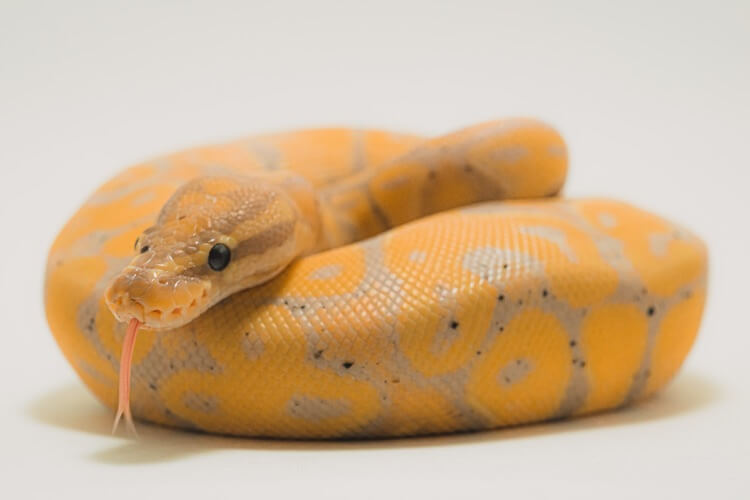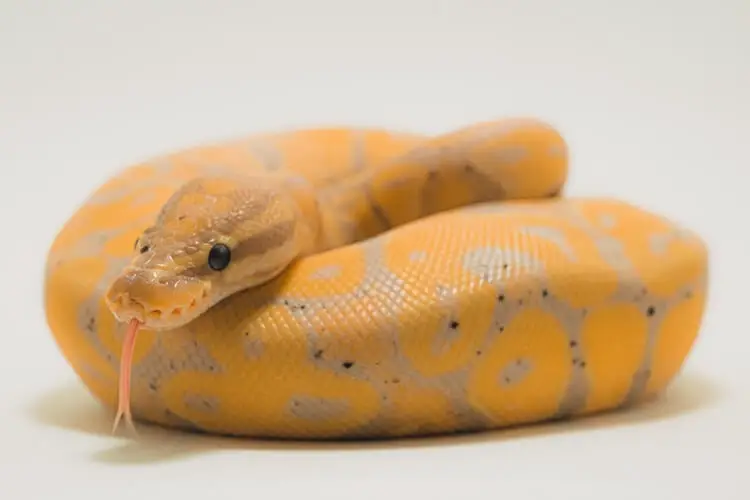Banana ball pythons are not your average snake; their vibrant yellow and white scales make them a popular choice among reptile enthusiasts. But what about their diet? What do these stunning creatures eat to maintain their health and beauty?
If you’re considering adding a banana ball python to your collection, it’s essential to know what to feed them. In this article, we’ll delve into the dietary needs of banana ball pythons, from their preferred prey to feeding frequency and portion sizes. So, let’s get started and ensure your pet is getting the nutrition they need to thrive.
Banana Ball Pythons are carnivorous and their diet primarily consists of small rodents such as mice and rats. They can also eat birds, lizards, and other small animals. As a pet owner, it’s important to provide them with a varied diet and to ensure that their prey is appropriately sized. It’s important to note that live prey should never be left unattended with your snake as they can injure your pet.

What Do Banana Ball Pythons Eat?
Banana ball pythons are a popular pet snake species that are known for their unique coloration and docile nature. However, like all snakes, they require a specific diet in order to thrive. In this article, we will explore what banana ball pythons eat and how to properly care for them.
1. Prey Items for Banana Ball Pythons
Banana ball pythons are carnivores and feed primarily on rodents in the wild. As pets, they can be fed a variety of prey items including mice, rats, and even small birds. When selecting prey items for your banana ball python, it is important to choose prey that is appropriately sized for your snake. The prey should be no larger than the widest part of your python’s body.
It is also important to ensure that the prey is appropriately sized for your python’s age and size. Juvenile pythons should be fed smaller prey items more frequently than adult pythons. Adult pythons may only need to be fed once every 2-3 weeks.
2. Live Prey vs. Frozen Prey
When feeding your banana ball python, you have the option of feeding live or frozen prey. Live prey can provide a more natural hunting experience for your snake, but it can also be dangerous for your python. Live prey can injure or even kill your python if the prey is too large or aggressive.
Frozen prey is a safer option for your python and is also more convenient for the owner. Frozen prey can be purchased in bulk and stored in a freezer until it is time to feed your snake. Before feeding your python frozen prey, it should be thawed in warm water and then heated to the appropriate temperature.
3. Feeding Schedule for Banana Ball Pythons
As previously mentioned, juvenile banana ball pythons will require more frequent feedings than adult pythons. Juvenile pythons should be fed once every 5-7 days, while adult pythons may only need to be fed once every 2-3 weeks.
It is important to establish a feeding schedule for your python and stick to it. Feeding your python on a regular schedule will help regulate their digestive system and keep them healthy.
4. Nutritional Requirements for Banana Ball Pythons
In addition to feeding your python the appropriate prey items, it is also important to ensure that they are receiving the necessary nutrients. Banana ball pythons require a diet that is high in protein and low in fat.
To ensure that your python is receiving the necessary nutrients, you may want to consider supplementing their diet with vitamin and mineral supplements. These supplements can be added to the prey item before feeding your python.
5. Water Requirements for Banana Ball Pythons
In addition to their diet, it is also important to ensure that your banana ball python has access to fresh water. Your python’s water bowl should be large enough for them to soak in and should be changed daily.
It is also important to ensure that the water in your python’s bowl is clean and free of contaminants. You may want to consider using filtered or bottled water to ensure the highest quality water for your python.
6. Feeding Tips for Banana Ball Pythons
When feeding your banana ball python, it is important to ensure that they are eating the prey item completely. If your python is not interested in the prey item, you may need to try a different type of prey or entice them with a live prey item.
You should also avoid handling your python immediately after feeding them. Handling your python can cause them stress and may lead to regurgitation of the prey item.
7. Health Concerns for Banana Ball Pythons
In addition to proper feeding and care, it is important to monitor your banana ball python for any signs of illness or injury. Some common health concerns for pythons include respiratory infections, parasites, and skin infections.
If you notice any unusual behavior or symptoms in your python, such as loss of appetite or lethargy, it is important to seek veterinary care immediately.
8. Conclusion
In conclusion, banana ball pythons require a specific diet in order to thrive as pets. They should be fed appropriately sized prey items on a regular schedule and supplemented with necessary vitamins and minerals.
In addition to proper feeding, it is important to ensure that your python has access to clean water and is monitored for any signs of illness or injury. By providing your python with the proper care, you can ensure that they live a long and healthy life.
9. Benefits of Owning a Banana Ball Python
Aside from their unique coloration and docile nature, owning a banana ball python can provide numerous benefits. They are relatively low-maintenance pets and can be kept in a variety of enclosures.
Banana ball pythons are also relatively long-lived pets, with a lifespan of up to 20 years. They can provide years of companionship and enjoyment for their owners.
10. Banana Ball Pythons vs. Other Snake Species
When considering a pet snake, it is important to compare different species to determine which is the best fit for your lifestyle and needs. Banana ball pythons are often compared to other python species, such as ball pythons and carpet pythons.
Compared to ball pythons, banana ball pythons are more rare and have a higher price point. They also have unique coloration that sets them apart from other python species.
Compared to carpet pythons, banana ball pythons are generally considered to be less aggressive and easier to handle. They also have a smaller maximum size, making them a more manageable pet for those with limited space.
Frequently Asked Questions
Here are some commonly asked questions about the diet of Banana Ball Pythons.
What do Banana Ball Pythons eat?
Banana Ball Pythons are carnivorous and feed primarily on small mammals such as mice and rats. In the wild, they also eat birds, lizards, and other small creatures. As pets, they should be fed pre-killed or frozen-thawed rodents to avoid the risk of injury to the snake and to ensure that the food is disease-free.
It is important to note that the size of the food should be appropriate for the size of the snake. Feeding a snake food that is too large can cause health problems, including regurgitation. Feeding frequency depends on the age and size of the snake, but adult Banana Ball Pythons typically eat once every 1-2 weeks.
Can Banana Ball Pythons eat anything besides rodents?
Banana Ball Pythons can eat other small mammals such as hamsters or gerbils, but rodents are the preferred food source. It is not recommended to feed your snake live prey as there is a risk of injury to both the prey and the snake. In addition, it is not necessary to feed your snake anything other than rodents as they provide all the necessary nutrients for a healthy diet.
Some pet owners may be tempted to feed their snake birds or lizards, but this is not recommended as these creatures may carry diseases or parasites that can harm the snake. It is best to stick to a diet of pre-killed or frozen-thawed rodents.
How often should I feed my Banana Ball Python?
The feeding frequency of a Banana Ball Python depends on its age and size. Young snakes should be fed more frequently, typically once every 5-7 days. As they grow, the feeding frequency can be reduced to once every 1-2 weeks for adult snakes.
It is important not to overfeed your snake as this can lead to obesity and health problems. The size of the food should also be appropriate for the size of the snake. A good rule of thumb is to feed food that is no larger than the widest part of the snake’s body.
What should I do if my Banana Ball Python refuses to eat?
It is not uncommon for snakes to refuse food, especially during shedding or when they are stressed. If your Banana Ball Python refuses to eat, there are a few things you can try. First, make sure that the temperature and humidity in their enclosure are appropriate as this can affect their appetite. You can also try offering a different type of food or scenting the food with something that your snake finds appealing.
If your snake continues to refuse food for an extended period of time, it may be a sign of an underlying health issue and you should consult with a veterinarian who specializes in reptiles.
Do I need to provide any supplements or vitamins for my Banana Ball Python?
If you are feeding your Banana Ball Python a diet of pre-killed or frozen-thawed rodents, they should be getting all the necessary nutrients from their food. However, some pet owners may choose to provide supplements or vitamins to ensure that their snake is getting everything they need. It is important to consult with a veterinarian who specializes in reptiles before adding any supplements to your snake’s diet.
Over-supplementing can be harmful to your snake and cause health problems. It is also important to make sure that any supplements you use are specifically designed for snakes and not for other types of animals.
Baby Banana Ball Python Feeding Video… WARNING! Mouse Stays Alive During the Eating Process.
In conclusion, as we have learned, banana ball pythons are carnivorous creatures that require a specific diet to maintain their health. It is important to provide them with a varied diet that includes rodents, birds, and other small mammals. Additionally, it is essential to ensure that their prey is appropriately sized and properly thawed before feeding.
As with all pets, it is crucial to research and understand their dietary needs to provide the best care possible. Banana ball pythons have unique dietary requirements, and it is essential to follow the recommended guidelines to ensure their well-being. With proper care and attention, these snakes can live long, healthy lives and bring joy to their owners for years to come.
In summary, feeding a banana ball python can be a rewarding experience, but it also requires responsibility. By understanding their dietary needs and providing the appropriate food, owners can ensure that their pet stays healthy and happy. Remember to always consult with a veterinarian or experienced snake handler if you have any questions or concerns about your snake’s diet.


